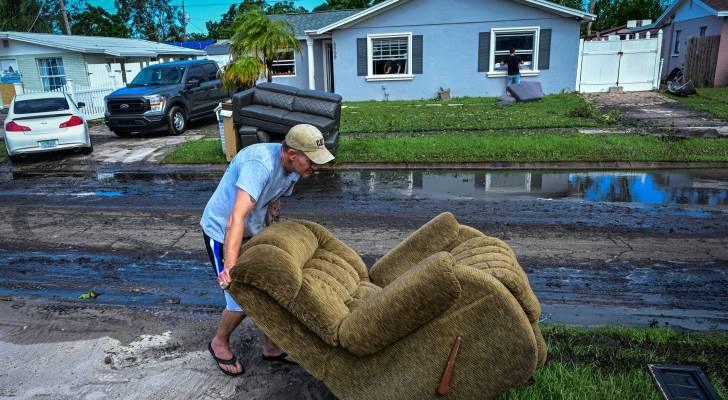Homeowners are stuck in this Florida city damaged by violent weather — many want to sell, but buyers are scarce


Floridians can’t catch a break. Their idyllic lifestyle, once highly coveted for vibrant communities and sunny views, are now saturated symbols of a hard truth: repeated storms and skyrocketing insurance premiums are turning seaside dreams into financial nightmares.
Hurricanes Helene and Milton dealt back-to-back blows to the state and with each passing storm season, climate change raises the risk of increasingly violent storms along with the costs of owning property in these high-risk zones.
Don’t miss
-
Accredited investors can become the landlord of Walmart, Whole Foods or Kroger — and benefit from regular distributions without lifting a finger. Here’s how
-
Car insurance premiums in America are through the roof — and only getting worse. But 5 minutes could have you paying as little as $29/month
-
These 5 magic money moves will boost you up America’s net worth ladder in 2024 — and you can complete each step within minutes. Here’s how
In the Tampa-St. Petersburg area, many homeowners appear desperate to sell but face a shrinking market of buyers willing to take on their costly burden.
Unforgiving storm season
Hurricane Helene, blamed for more than 300 deaths as of Oct. 17, made landfall in the area known as Big Bend, where Florida’s panhandle gives way to the peninsula.
Milton raced in two weeks later, directly hitting Tampa Bay with destructive winds and massive storm surges. Homes that were once admired for their quaint charm are now marred by shattered roofs, waterlogged interiors and uprooted trees.
The storms have fed a seemingly endless preparation-and-recovery cycle, with one storm arriving before full repairs from the previous one are complete.
At the same time, exhausted homeowners are trying to keep pace with ever-increasing insurance premiums resulting from payouts from these storms. Those costs were already well above the national average before the 2024 storm season, and they’re sure to rise again when the season passes.
Skyrocketing insurance costs are driving people out
Florida is no stranger to high insurance costs. Even before Helene and Milton rushed ashore, property owners in the state were paying roughly four times the national average for home insurance.
Even those fortunate enough to find a willing insurer are being met with deductibles so high that covering damage out of pocket seems almost inevitable. More than 30 insurance providers have either reduced their coverage or exited the state altogether.
Insurance isn’t the only worry. Hurricanes in Florida are also stoking strange housing-market dynamics that locals say threaten the history of many of the state’s quaint coastal towns.
Housing inventories are rising in larger Florida cities such as Orlando and Tampa, but demand is falling. In Tampa, which is particularly exposed to storms because of overdevelopment and delayed floodwater defenses, the majority of Tampa’s available homes have seen price cuts.
Property values are dropping, and many homes once seen as valuable investments in a sunny paradise are now regarded as liabilities. Even for potential buyers attracted by reduced prices, the cost of insuring, repairing and fortifying these homes against future hurricanes is a significant deterrent.
Many buyers simply cannot afford the ongoing expense of rebuilding every time a storm hits, and those that can are often wealthy investors who either flip the homes or relocate to the area and, over time, change its feel.
“The price of repairs may mean we lose our character,” Sam Henderson, mayor of Gulfport, Florida, a Tampa suburb that caters to the arts and fishing, told the Tampa Bay Times. “There will be a different kind of people who can afford to live here, moving forward.”
Read more: Rich, young Americans are ditching the stormy stock market — here are the alternative assets they’re banking on instead
What are the options?
Homeowners have some options, but each has its challenges:
Renting the property. Homeowners could consider renting their property as a vacation rental. But this requires navigating local regulations and investing in repairs to make the property rental-ready. Additionally, the off-season and storm-season risks mean potential rental income may not be steady year-round.
Selling to investors. Real estate investors who specialize in distressed properties or high-risk areas may be willing to buy, but typically at a discount. Homeowners may receive offers well below market value, but this option could allow them to cut their losses and move on.
Renovating for resilience. For those willing to invest in their current property, making storm-resistant upgrades — like impact-resistant windows, elevated foundations and waterproofing measures — can increase the home’s appeal to future buyers.
Seeking state or federal assistance. In some cases, homeowners may qualify for disaster relief programs or grants that can help offset the cost of repairs and insurance. Additionally, the Federal Emergency Management Agency (FEMA) offers programs that assist with mitigation efforts%2C%20and%20within%20NFIP%2D), like installing flood barriers, to protect homes from future damage.
What to read next
This article provides information only and should not be construed as advice. It is provided without warranty of any kind.
#Homeowners #stuck #Florida #city #damaged #violent #weather #sell #buyers #scarce






